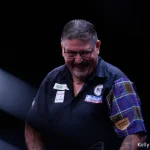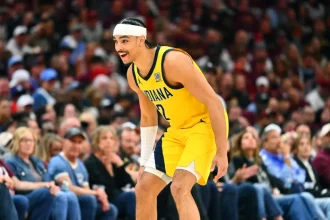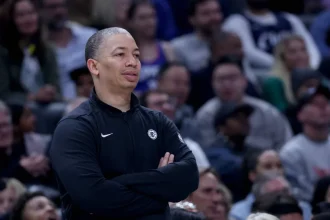“It will test your head, and your brain, and your mind, too.” That wildly redundant line comes from Dewey Finn, the electric teacher played by Jack Black in School of Rock, describing what it means to be in a rock band. On the surface, it might seem worlds away from Amanda Anisimova’s breakthrough run to her first US Open semifinal. Yet, as I watched her progress—growing bolder and more confident with every match—that fiery spirit of throwing yourself fully into the moment kept coming to mind.
Like playing rock music, tennis demands you put yourself on the line. There’s no hiding, no holding back—only total commitment to the competition, the performance, and the risk of failure. Anisimova has been a talented player for years, her raw ball-striking a constant promise since she was a teenager. But this season, she’s finally started to live up to that promise, shaking off the nerves and doubts that used to trip her up.
Her commanding 6-2, 6-1 victory over Beatriz Haddad Maia in the fourth round was a revelation. For the first time, she urged the Ashe crowd to cheer louder—raising her hands briefly to rally the fans—and hit every ball with unshakable conviction. This was a different Anisimova from the one who suffered a crushing 6-0, 6-0 loss to Iga Swiatek at Wimbledon just two months prior. Instead of being haunted by that memory, she seemed determined to rewrite her story.
“I feel like I was really able to bounce back from it really quickly,” she said. “Maybe a few years ago, I wouldn’t have done the same as well as I have this time.”
The real test came in her quarterfinal rematch against Swiatek. After losing serve in the opening game, Anisimova didn’t crumble. Instead, she fought back fiercely, breaking Swiatek to avoid another shutout and gaining the crowd’s roaring support. The two traded blistering baseline shots, but Anisimova’s returns—especially her backhands—were crisper, deeper, and more precise. She kept pressing Swiatek’s forehand, controlled the corners, and stayed mentally strong throughout.
Her stats told the story: 23 winners to Swiatek’s 13, and fewer unforced errors. When she fell behind 0-2 in the second set, most players would panic or doubt themselves. But not Anisimova. She dug in, held serve from 15-30 down, pumped her fists, and spoke positively to herself and her coach. Instead of fearing mistakes, she treated them like surprises to overcome.
“Today I’m really proud of myself,” she said. “I showed that if you put out a positive mindset and work through challenges, you can get a good result.”
Even luck seemed to favor her near the end—after squandering two match points and double faulting, she saved the last one with a delicate backhand that clipped the net and landed just inside the line. Sometimes, you earn your breaks.
Her biggest lesson? Fear has no place on the court.
“When I started the tournament, I had a bit of fear and was holding back,” she reflected. “But as I progressed, I told myself, ‘You can’t go into a match with fear,’ especially against top players. If I want to win, I have to play brave and strong tennis.”
And with her performance this week, Amanda Anisimova proved she’s ready to do just that.
If Dewey Finn were watching, he’d be proud.














